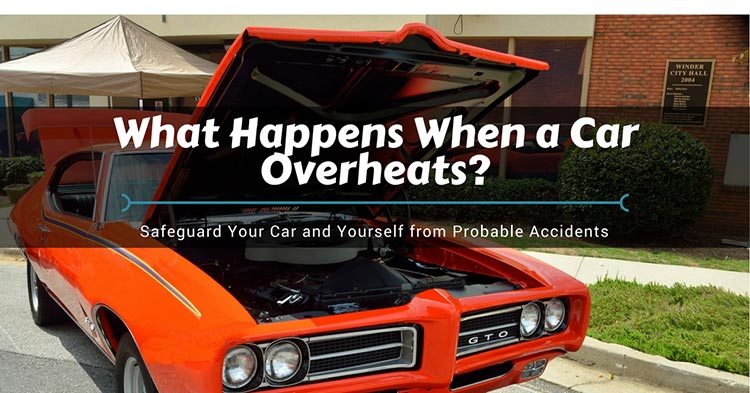
What Happens When a Car Overheats? Safeguard Your Car and Yourself from Probable Accidents!
Is your car overheating frequently? Do you find that your car engine is smokin’ hot after your car erratically comes to a halt? Are you curious as to what happens when a car overheats?
More...
If you nod in affirmation to any of these questions, then this blog post is for you. Here you’ll get to know why your car overheats, the signs to look out for when your car overheats, and how you can prevent and deal with it.
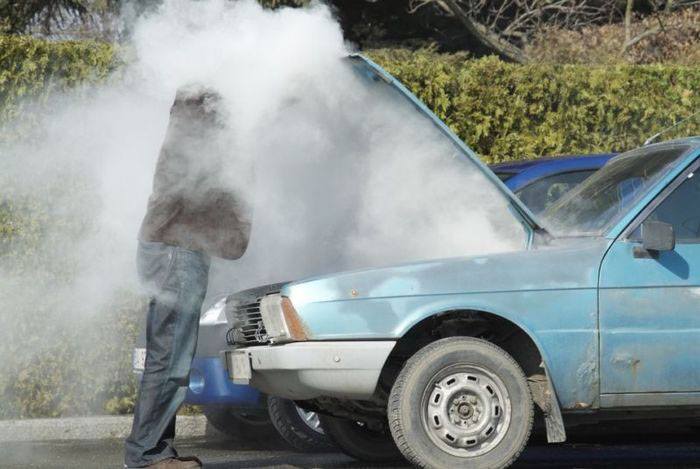
Image source: carthrottle.com
A few days back I noticed that the engine of my car was overheated. This was when I searched this car issue. I looked for signs that indicated towards this problem and then took appropriate measures to rectify the problem at hand. I really benefitted with the tips I’m offering in this article. You too can make use of these tricks and prevent your car and its engine from getting damaged.
Consequences of Car Overheating
A car engine typically requires servicing within its initial 5 to 7 years. However, a few car engines can go on for a decade without any hassles. Nevertheless, it is crucial to maintaining your car in order to protect your vehicle’s engine so that you don’t have to replace or work on it frequently. Even though a car engine is pretty durable, it can’t bear exceedingly high temperatures for long time periods.
At such times, not only the car engine can stop short, but also the gaskets and seals can be severely broken down when they’re exposed to high temperatures they can’t handle. In all, overheating can irreparably damage the car, which even money can’t fix. This is why it’s important to understand why this happens and how you can prevent or deal with such a situation.
Why Does a Car Overheat?
Generally, a car overheats in an extremely hot weather. No matter whether it is an old or modern vehicle, the most advanced automobile can overheat in such a condition. Additionally, your car can overheat when you are climbing a lofty grade or in a stop-and-go-traffic on a very hot day.
A car engine can overheat when its ability to transfer, absorb, and disperse heat reduces. Although there are many potential causes of overheating, a few are more prevalent as compared to others. A lot of causes can be easily fixed by going to a trustworthy mechanic and replacing comparatively economical parts. You can take a look at this video for knowing more about car overheating:
The common car overheating causes include:
1. Low Antifreeze or Coolant
One of the most common reasons behind car overheating is a low level of its coolant, which is also called antifreeze. Coolant is important for maintaining the normal functioning of the car within standard temperatures.
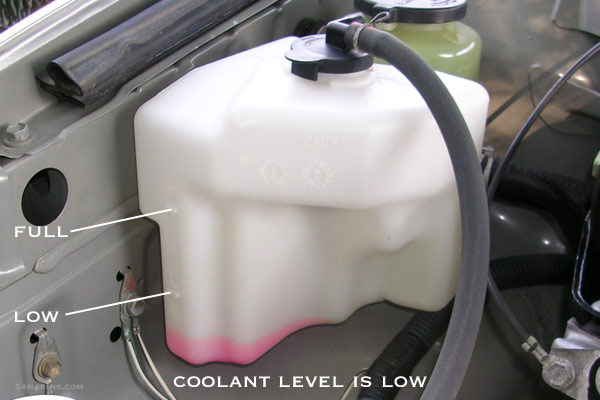
2. Defected Thermostat
One of the other causes of overheating is a faulty thermostat, which is quite annoying for drivers. A bad thermostat can indicate that the temperature is normal even if it’s too hot. Owing to false readings, the car can’t release antifreeze at the right time. Moreover, when a car with a damaged thermostat runs for a while, it becomes hotter progressively, which in turn results in the stalling or billowing of smoke.
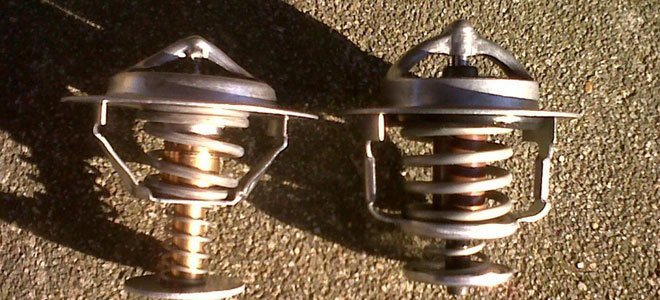
Image source: doityourself.com
3. Low Level of Motor Oil
A car might overheat when it has a low level of motor oil. This is because the oil takes away the heat from the car’s engine. Additionally, a low level of oil can also lead to other harmful consequences. For instance, oil works as a lubricant and when there is no or low oil, it can cause corrosion of a few car parts since they’re not sufficiently lubricated.
These are some of the common reasons behind the overheating of a vehicle. So pay heed to these reasons in order to avoid a car overheating scenario.
Signs to Look for When a Car Overheats
As a driver, you should know what all damages can be caused by overheating. Additionally, you should know when it happens and what to do to fix the damage. However, this knowledge is of no use if you are not aware of the signs showed by an overheated car engine.
Although you should prevent car overheating at all costs and regularly maintain your car and its engine to minimize the chances of car overheating, still at times it can happen anyhow. Make sure that you clean your car’s engine block on a regular basis in order to maintain the performance of the engine and save it from any damage in future.
Nevertheless, when you know that your car is overheating, you can quickly switch it off in order to avoid any further damage to your vehicle and its engine. In order to know that your car is overheating, you need to check out some things. These include:
1. Smoke or Steam
Whenever you see smoke or steam billowing from under the hood of your car, you should immediately stop your car. This is not a good sign in any case. It can indicate other things as well, like harmless and simple leaking oil burning in the engine or even an overheated engine. No matter what the problem is, it is advisable to get your engine examined by a trustworthy mechanic.
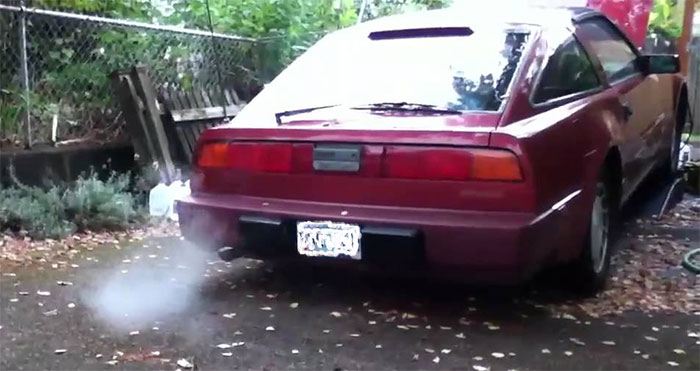
Image source: daniel
2. Dashboard Caveats
The dashboard can indicate the driver of an overheated engine as the dashboard temperature indicator will begin to rise. Often, people neglect the warnings given by the dashboard, they are nonetheless important.
Only when the thermostat of the car is faulty, the dashboard will not notify you; in all other cases, it will. Additionally, in modern cars, a malfunction light turns on when the car starts to overheat.
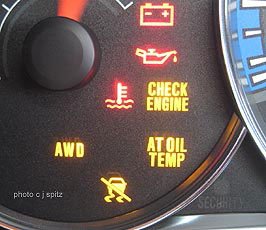
Image source: repairtrust.com
3. Hot Air from the Air Conditioner
Even though hot air coming out of the car’s A/C doesn’t signify that the car is presently overheating, it most probably means that it will soon be. You can solve this issue by putting coolant in your car.
What to Do When you Find Your Car Overheating?
When you see that your car engine has overheated, the first thing that you must keep in mind is not to panic, be calm and cool. Read this guide to know how you can help your automobile to stay cool.
- As soon as you become cognizant of the very first indication of overheating, you must shut off your vehicle’s air conditioner and then open its windows. This way the engine load diminishes and thus helps your car to cool off.
When the above method does not work and your car is still overheating, just switch on the blower and heater. By this, the heat will be transferred from the car’s engine to its passenger section. Although this is a great way to cool down your overheated engine, it will make you hotter!
- In case your car’s temperature gauge is rising or your vehicle has halted in traffic, you should shift your gear into Park or Neutral mode and then accelerate the engine to some extent. Through this, the speed of the fan and the water pump increases, which in turn pulls in more air and liquid via the radiator. With the augmented circulation of the liquid and air, the engine cools off.
Ensure that your car does not have a low coolant level. For this, you must refill the antifreeze and pay attention to its level. However, make sure that you take the help of a reputable mechanic or a person who knows cars better when you’re checking the coolant level since it can be a bit perilous if you don’t know what you’re doing.
- The thermostat in your car should be in the best condition if it’s not, consider replacing it, after which you’ll see the vehicle will not overheat if the problem lies with the thermostat of the car.
- Your motor oil should be at a proper level. To know the appropriate level of oil, its changing time, or its refilling time, you should refer to a local car dealership or a car manual. Since different cars use different oil types, you shouldn’t put any random oil in your car. According to the type of motor oil, its price range varies.
Take a look at this helpful video in order to know about more ways to fix your car’s overheating issue
Conclusion
So now that you know what is car overheating, why it happens, and what it can result into, you must look for the signs that indicate so. When you read the signs, you can take appropriate measures to prevent as well as solve this issue and thus save your car and engine from any further, irreparable damage.
Make sure you take your car for maintenance on a regular basis in order to avoid its overheating, which is generally the outcome of negligence on your part, such as driving for too long without changing the car oil or not paying heed to the dashboard alerts.
Related Posts
Fleet Fuel Cards for Optimal Car or Truck Expense Tracking
Top Simple Ways to Improve the Look of Your Car
3 Things You MUST Know Before Buying Car Parts
How to Increase Your Visibility When Driving at Night
Negotiating a New Car’s

